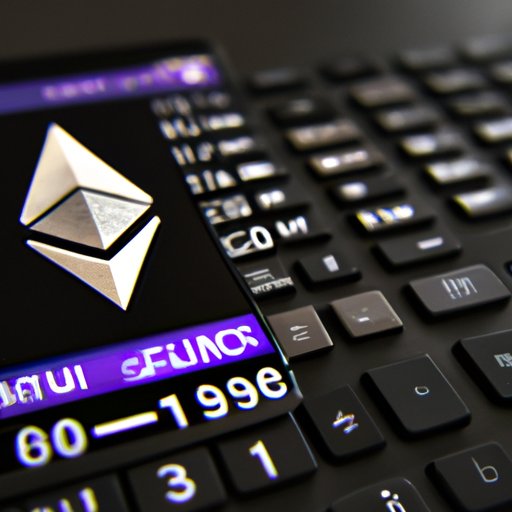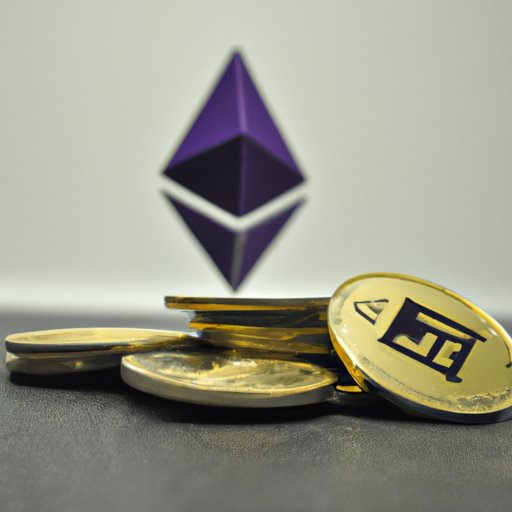Introduction
Ethereum is a decentralized, open-source blockchain network and cryptocurrency that enables users to transfer value and execute smart contracts without the need for a middleman or third party. It was first proposed in 2013 by Vitalik Buterin and launched in 2015. Since then, it has become one of the most popular cryptocurrencies on the market.
But what is Ethereum worth? The answer to this question isn’t so simple as Ethereum’s value is based on a number of different factors. In this article, we will explore these factors and how they influence Ethereum’s worth.
What Factors Impact Ethereum’s Worth?
Ethereum’s worth is determined by a combination of supply and demand, market conditions, and network usage. Let’s take a closer look at each of these factors.
Supply and Demand
Like any other asset, Ethereum’s value is heavily influenced by supply and demand. When there are more buyers than sellers, the price of Ethereum rises. Conversely, when there are more sellers than buyers, the price falls.
Market Conditions
The broader market conditions also affect Ethereum’s worth. For example, if the stock market or global economy is doing well, investors may be more likely to invest in Ethereum, driving up the price. On the other hand, if the stock market or global economy is struggling, investors may be less likely to invest in Ethereum, causing the price to fall.
Network Usage
Finally, Ethereum’s worth is also impacted by its network usage. If more people are using Ethereum for transactions and smart contracts, the demand for Ethereum increases, which drives up the price. Conversely, if fewer people are using Ethereum, the demand decreases and the price falls.
Analyzing the Ethereum Market and Its Performance
Now that we’ve discussed the factors that affect Ethereum’s worth, let’s take a look at how Ethereum has been performing in the market.
Historical Price Analysis
Ethereum’s price has had its ups and downs over the years, but overall it has been steadily increasing. At the time of writing, Ethereum is trading at around $1,900 per coin, which is significantly higher than its all-time low of $0.31 in 2015.
Volatility
Although Ethereum’s price has been increasing over time, it is also highly volatile. This means that the price can fluctuate dramatically in a short period of time, making it difficult to predict where the price will go next.
Mining Profitability
Ethereum is mined using specialized hardware and software, and miners are rewarded with newly created coins for their efforts. As of now, Ethereum mining is still profitable, though the rewards have decreased significantly since the network’s launch in 2015.

How to Calculate the Value of Ethereum
If you want to calculate the value of Ethereum, there are a few steps you can take. Here are some tips:
Use a Cryptocurrency Exchange
The easiest way to calculate Ethereum’s worth is to use a reliable cryptocurrency exchange. Most exchanges list Ethereum’s current price, which is updated in real-time.
Look at Other Crypto Assets for Comparison
You can also compare Ethereum’s performance to other crypto assets to get a better understanding of its value. Looking at the performance of Bitcoin, for example, can give you an indication of how well Ethereum is doing.
Check Out Ethereum’s Technical Indicators
Finally, you can look at Ethereum’s technical indicators to get a better idea of its worth. You can use tools like the Moving Average Convergence Divergence (MACD) and Relative Strength Index (RSI) to analyze Ethereum’s historical price data and gain insights into its future price movements.

The Pros and Cons of Investing in Ethereum
Investing in Ethereum can be a great way to make money, but it also comes with risks. Here are some of the pros and cons of investing in Ethereum:
Pros
- Potential for high returns
- Decentralized and secure
- Easy to buy and sell
Cons
- Highly volatile
- Risk of scams and fraud
- Difficult to track and predict
Conclusion
In conclusion, Ethereum’s worth is determined by a combination of supply and demand, market conditions, and network usage. Analyzing Ethereum’s historical price data, volatility, and mining profitability can help you get a better understanding of its value. Finally, investing in Ethereum comes with both potential rewards and risks, so make sure you do your research before investing.
(Note: Is this article not meeting your expectations? Do you have knowledge or insights to share? Unlock new opportunities and expand your reach by joining our authors team. Click Registration to join us and share your expertise with our readers.)
